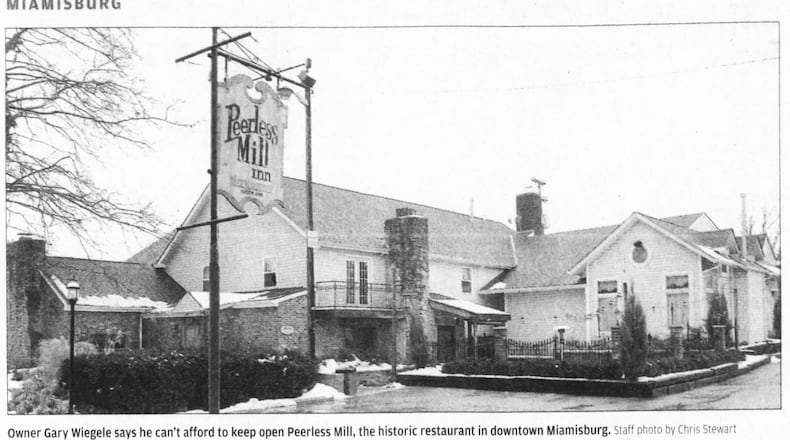The building, 319 S. 2nd St. in Miamisburg, traces its history back to 1828, when it served as a sawmill on the Miami & Erie Canal for early pioneers.
The lumber mill made many of the planks and posts needed to build wagons, barns and much of Miamisburg.
It was built when the Miami-Erie canal was a Western Ohio transportation artery.
The sawmill was later converted to a grist mill.
Farmers from miles away loaded their grain and came to town to use the mill.
Peerless Pantry
In 1930, the Dayton Daily News reported on the upcoming opening of the Peerless Pantry restaurant:
“Something unique, different, infinitely interesting is the Peerless Pantry restaurant, South Second St., Miamisburg ... Beyond the memory of the oldest inhabitant of the Miami Valley is the date of the construction of the sturdy building that houses the Peerless Pantry, the dream of the owner, Samuel Elwood Waters, proprietor of the Peerless Mills and of the ancient granary (a storehouse for threshed grain) that is now the home of this novel restaurant.”
The story went on to report: “The Peerless Pantry gives Miamisburg and surrounding territory at last an ideal place for private parties, fraternity and club gatherings, dinners in private, with exquisitely designed and alluringly equipped private dining rooms upstairs and down.”
Features of the restaurant listed were its own bakery, expert chefs, a skilled hostess and incomparable service.
The restaurant had flagstone floors and hand-hewn beamed ceilings, along with colonial-era antiques in the original Mill Room.
When it opened the menu included roast turkey, beef and duck, and meals went for no more than $1.45 and no less than 95 cents.
For decades, Long Island Duckling was famed as a specialty of the house. It was basted in sherry and thyme to accent its rich flavor.
Bahl Family ownership
The Bahl family purchased the restaurant from Waters and owned the Peerless Pantry from 1944-1959.
Sisters Sharon Bahl Gilmore and Leslie Luhn worked at the restaurant while their parents and grandfather owned it. The two sisters shared some of their memories with the Dayton Daily News in 2004.
Their father was Herbert Charles Bahl Jr. He ran the restaurant that was owned by Herbert Charles Bahl Sr.
Gilmore said she learned a lot while working at the restaurant.
“I was put to work at age 12, busing tables on Saturdays and Sundays. Later, I learned how to keep the books, to wait table, to be the hostess ... It was a fun childhood. We thought it would never end.”
Gilmore recalled that the McGuire Sisters, who grew up in Miamisburg, were among the restaurant’s patrons. The Rotary Club and other civic groups met there, and businessmen in downtown Miamisburg would come to lunch daily.
At the time, the restaurant was known for its home cooking. The menus were printed daily.
Both women recalled their dad always being at the Peerless Pantry during those years.
“If we wanted to see dad, we had to go have dinner with him,” Luhn said.
The family eventually sold the restaurant when competitors like the Golden Lamb in Lebanon and the Wishing Well in Centerville began serving alcohol.
Gilmore said she and her dad wanted to apply for a liquor permit for the Peerless Pantry, too, but her grandfather, a 32nd degree Mason, resisted, saying he would rather sell the place.
In 1959, Herbert Bahl Sr. sold the Peerless Pantry to Viola Rath, who also operated Rath’s Catering.
Peerless Mill Inn
Barbara and Donald Walsh took over ownership of the restaurant in 1980. The restaurant was then named the Peerless Mill Inn.
In a 1993 Dayton Daily News interview, Walsh said that during the 1960s, expansions were made to the restaurant. The Heritage room and a large banquet room were added.
In 1992 another banquet room was added. With its six dining areas, the restaurant could serve groups up to 150 and 300 total patrons.
Gary Wiegele bought the restaurant from the Walshes in 2001.
Major fire
The Peerless Mill building was the subject of many small fires through the years, but a major fire almost totally destroyed the building on January 24, 2003.
Credit: Ron Alvey
Credit: Ron Alvey
Wiegele decided to rebuild, borrowing substantially to do so, and reopened in November 2004.
Workers had been able to salvage beams, posts and barn wood, which were used in the restoration.
Closed for good
Business was healthy until late 2006, when the Peerless Mill started feeling the effects of a restaurant opening boom in the region.
Wiegele said competition from commercial developments like The Greene made it very tough to stay in business.
Credit: Staff photo by Chris Stewart
Credit: Staff photo by Chris Stewart
The restaurant closed for good less than four years after it reopened after the fire, with the last day of business being April 30, 2008.
“We just can’t afford to keep it open,” Wiegele said. “The bottom line is we’re broke. And I’m personally broke.”
Star City Brewing
The building that housed the historic Peerless Mill restaurant in Miamisburg will sprung back to life in November 2013, when the Star City Brewing Company opened.
Photo Gallery - Peerless Mill becomes Star City Brewing Co.
Miamisburg officials were pleased when Star City’s brewery project was announced, saying the 14,000-square-foot building that housed the former Peerless Mill had become a target for vandals and was in danger of becoming an eyesore.
Credit: JIM WITMER
Credit: JIM WITMER
About the Author









